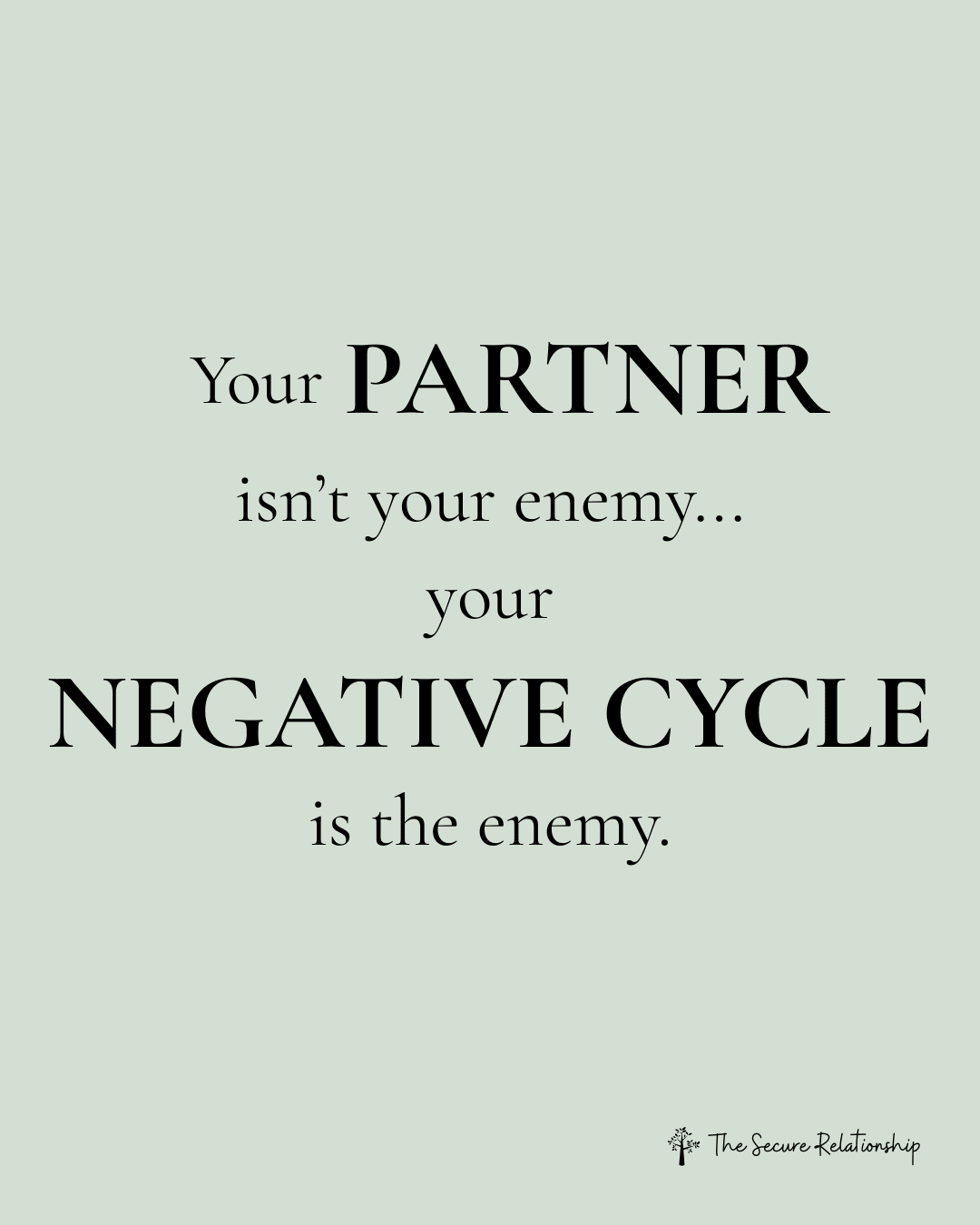Tips for Preventing the Negative Cycle When Discussing a Difficult Topic
Tips for Preventing the Negative Cycle When Discussing a Difficult Topic
Even the most connected couples get stuck sometimes. But when you know how to stay out of the negative cycle, hard conversations can become opportunities for closeness, understanding, and emotional growth.
Here’s how to keep your relationship grounded when discussing tough topics:
1. Agree on When to Talk
Sometimes one partner needs to think about a difficult topic before talking about it. If it’s not urgent, it’s a good idea to allow space for each partner to feel ready to talk.
This doesn’t mean putting off the conversation indefinitely; this wouldn’t work either. It just means both partners need to agree on a time to address the issue in the near future.
Anxious partners tend to want to talk about the issue right then, while avoidant partners tend to want to avoid the issue altogether.
Try to work with both needs in a balanced way.
2. Use Secure Attachment Language
Include attachment words whenever possible. This will create emotional safety and show your partner you’re not the enemy—you’re their teammate, someone who cares so much about the relationship that you’re willing to work on it.
“I know it can be hard for us to talk about topics we don’t agree on, but I care so much about our relationship that I want us to learn how to be strong communicators. Can we give it a shot?”
This way of speaking is regulating to partners (keeps them out of fight-or-flight), and sets up the conversation for success.
3. Make the Cycle the Enemy
Another way to use attachment language is to externalize the cycle: the negative cycle is the real enemy, not each other.
Try:
“The negative cycle is happening right now. Let’s not allow it to tear us apart.”
“We’re in the negative cycle and going down a dangerous road. I don’t want to do that to our relationship.”
“I care too much about you and our relationship to continue this negative cycle right now. Let’s take a break and come back to it later so we don’t let it hurt us.”
4. Include Vulnerability
Vulnerability inspires empathy. When your partner is feeling empathic, they’ll be more open to hearing you.
“The reason it’s important for me to talk about our finances is because being financially ok helps me feel safe. I’ve been anxious about it lately, and I’m even losing sleep. It’s really affecting me.”
5. Address the Behavior, Not the Person
Your partner should not feel attacked as a person. That’s shame-inducing and not helpful for a healthy relationship.
Instead of: “You never clean up after the dog.”
Try: “I’m noticing there’s dog hair all over the house. Can we try to find a solution?”
6. Avoid the Words “Always” and “Never”
These words almost always take the conversation down a dead-end road. It’s easy to argue for exceptions when someone is making blanket statements. When this happens, the original issue gets buried and unresolved.
Couples get stuck arguing facts and details—what I call “out-attorney-ing each other.”
Also? “Always” and “Never” are often just not true. Stick with what’s true.
7. Don’t Get Defensive
Try to hang in there without going into defense mode. Sometimes it helps to be transparent about your urge and say:
“I feel the need to start defending myself, but I know that won’t get us anywhere.”
Your partner needs to be able to bring up a concern without it being interpreted as an attack on who you are. At the same time, your partner is responsible for expressing concerns without going to a place of blame, shame, or criticism.
Try:
“I want to hear you, but it’s hard when I’m feeling attacked. Can we try this in a new way?”
8. You Don’t Have to Agree
This one’s huge. Believing you have to agree is a major sticking point for a lot of couples. The truth is: it’s not possible for two people to agree on everything all the time.
When partners believe they need to agree in order to move forward, they often get stuck trying to prove each other wrong—which usually just escalates things.
It’s more helpful for both partners to be willing to hear and understand each other’s perspective.
If any change of belief is going to happen, it’s more likely when partners feel heard and respected. And sometimes, you’ll just have to agree to disagree. That’s part of being in a mature relationship.
9. If None of This Is Working...
Not all couples can implement these changes and get unstuck on their own. This often means there are deeper childhood attachment wounds or relationship trust issues that need to be worked through with professional help.
If you and your partner can’t communicate without slipping into ineffective or destructive habits, it may be time to get support.
That said, this work takes practice. It’s never going to be perfect—especially at first.
The key is being able to work together to grow and make changes. And if your partner isn’t ready to do that yet, make the changes on your own. Whether that’s fair or not, it’s better than no change at all if you’re choosing to stay in the relationship.
Support for Breaking the Cycle
Relationship Coaching – Get expert guidance on real-time communication challenges.
Couple and Individual Group – Practice these tools with support and community.
“The cycle is the enemy—not each other.”


Trying to control your environment—like keeping a spotless house—can sometimes be a way to manage inner anxiety caused by relationship disconnection. But when that strategy backfires, it can create more of the very disconnection you’re trying to avoid. This post explores how personal anxiety shows up in relationships, and how couples can break the cycle.